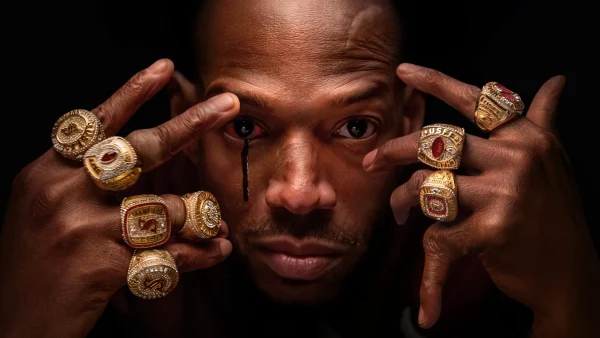Elvis disappoints, leaves viewers wanting more
Elvis is another cog in the machine of uninspired musical biopics, Hollywood’s latest fad. And in a similar vein to its predecessors, it seems to serve little purpose other than for its lead actor to play dress-up and sing karaoke.
Elvis tells the story of larger-than-life rockstar Elvis Presley (Austin Butler), utilizing the unnecessary narrative framing of his shady manager Colonel Tom Parker’s ramblings of retrospect (Tom Hanks). Parker manages carnival acts with the sole intent to capitalize on any cash cow attraction he can find. When an associate of his introduces him to a young and hungry Elvis Presley, Parker promptly takes notice of Presley’s unmatched showmanship and envisions a vast fortune to be made.
As Presley basks in admiration from carnival crowds, his stock skyrockets. Colonel Parker puts all his chips into making the young Elvis Presley an international star. In no time, Presley garners a legion of both fans and detractors internationally, the latter of which find his hip-thrusting performances to be obscene.
Throughout the next 2 hours of Elvis, director Baz Luhrmann attempts to paint an equally tragic and glorious picture of Presley’s trials and triumphs as a world-renowned superstar. Yet when I turned my back on the eye candy of its grandiose reenactments, I found that Elvis fails to provide any true insight into the icon that goes beyond the surface level. More often than not, Elvis is subjugated to being an overblown, nostalgia-induced highlight-reel of Presley’s greatest moments And while that is sufficient entertainment, it pales in comparison to a fascinating introspective look at a strung-out Elvis Presley in the later years of his life that we could’ve gotten.

As an inspection of the parasites of the entertainment industry through Presley’s relationship with his manager Colonel Tom Parker, Elvis fails at providing any source of fascination. On paper, Parker’s appalling lies, bloodsucking greed, and bizarre past make for an excellent and fresh addition to a tired biopic formula. Yet in practice, it falls flat. Baz Luhrmann writes Parker as a ridiculous caricature with an abundance of dull monologue sequences.
The indescribable thick accent Tom Hanks plays him with is distracting. Their relationship is given enough of a spotlight for it to be a major aspect of the film but is too misguided to be effective. Rather, it just winds up feeling like an admirable but failed attempt at a new lens for Elvis’s story.
The plot woes of Elvis are in no way assisted by palatable visuals. The cinematography feels needlessly breakneck to an almost nauseating degree, inspiring more exhaustion than awe. The jolted camerawork feels isolated from the story, a separate entity disconnected from the film’s content.
As an inspection of Presley’s life, death, and demons, Elvis is hollow. Far too many stones are left unturned. We see Presley’s life reduced to ashes, but never the flames burning. We see that he has gone bankrupt, but never his impulsive purchases. We see that his wife is divorcing him, but never the full scale of his infidelity. Even the prime catalyst of his downward spiral and consequential death, drugs, are minimized to a footnote.
The appearances of his fatal addiction are scarce: once being a young Elvis Presley introduced to a pill in his days as a carnival act, and once again when he’s at the end of his road with enough prescription pills to stock a CVS. Nothing in-between. No gradual worsening.
The older crowd will leave with a smile on their faces, having relived their favorite Elvis Presley moments thanks to a young and promising Austin Butler’s essence-capturing performance. On the flip-side, the younger crowd will leave with a Wikipedia page skim worth of knowledge, and no further familiarity with Presley’s conscience, which is exactly what a biopic should set out to do in the first place. That is the core principle that director Baz Luhrmann fails to understand, and why Elvis is so vast yet feels so barren
Despite Elvis’s flaws in its entirety, Austin Butler’s breakout performance as the icon is breathtaking. However, will it be enough to challenge Brendan Fraser’s performance in The Whale at the 95th Academy Awards? As Austin Butler carries a Golden Globe for Best Actor in a Drama and Brendan Fraser a Critics’ Choice Award for Best Actor, the newcomer and the veteran butt heads. But will Fraser’s comeback narrative be enough to give him the leg up?
Contrarily, Comedic Golden Globe and National Society of Film Critics Award-winning Colin Farrell could snag the Best Actor award for his performance in The Banshees of Inisherin.
Be sure to mark your calendars for nomination announcements on Jan. 24 and the Oscar ceremony on Mar. 27. As the three-way Best Actor race goes down to the wire, you can anticipate anything.

Sam Dababneh is a senior at Niles North High School. This is his fourth year on North Star News. He writes as a film critic and as a columnist covering...






